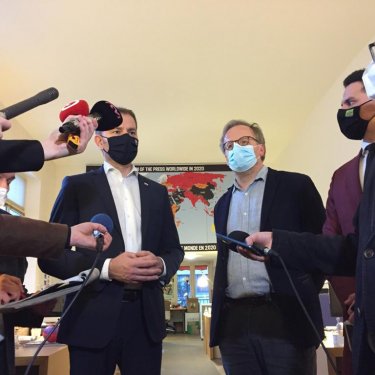Slovak premier visits RSF, encouraged to turn his country into “press freedom model for Europe”

When Slovak Prime Minister Igor Matovič visited the headquarters of Reporters Without Borders (RSF) in Paris yesterday, RSF secretary-general Christophe Deloire deplored the failure to convict those who masterminded investigative reporter Ján Kuciak’s murder and urged Matovič to move from promises to action, with bold measures to protect journalists.
The Slovak premier’s working visit to RSF came less than three weeks before the third anniversary of the murder of Ján Kuciak and his fiancée Martina Kušnírová at their home outside Bratislava on 21 February 2018.
“Given Ján Kuciak’s murder, Slovakia has special responsibilities. Turn your country into a press freedom model for Europe,” Deloire told Matovič.
However, he added: “We have been dismayed to see that, while two of the murder’s perpetrators and an intermediary have been convicted, the mastermind or masterminds have not. If this is as far as it goes, it will remain as stain on Slovakia’s contemporary history.”
In RSF’s view, several conditions must be met for Slovakia to become a model: better protection for journalists, an end to verbal attacks on the media by politicians, reinforcement of the public broadcaster’s editorial and financial independence, and the punishment of crimes against journalists, especially the murder of Kuciak and his partner.
Although Marian Kočner, the businessman suspected of ordering Kuciak’s murder, and his associate, Alena Zsuzsová, are in prison in connection with other crimes, they were acquitted last September of the Kuciak murder. The prosecutor’s office filed an appeal against their acquittal that the Supreme Court will hear this year. In the event of their acquittal being revoked and in the case further evidence is needed, Deloire urged Matovič to facilitate the reestablishment of the “Kuciak unit” within the police to pursue the investigation
Matovič told Deloire that, by giving the Slovak justice system a “free hand” to combat corruption, he hoped to “eliminate the system that had made [Kuciak’s murder] possible.” Kuciak specialized in investigating corruption for the Aktuality.sk news site.
Deloire insisted on the importance of protecting journalists. The Slovak police have made little headway in their investigation into private sector surveillance of around 30 journalists in 2017 and 2018 (in which Kočner is also a suspect) or their investigation into attempts to intimidate Aktuality.sk journalist Peter Sabo, who found a bullet in his letterbox last June. Monika Tódová, an investigative journalist with Denník N, also reported being watched by two men for several days last December and January.
The president of the Slovak parliament’s Culture and Media Commission, Kristián Čekovský, who accompanied the prime minister on his visit to RSF, presented new measures for protecting journalists and their sources, improving access to information, abolishing imprisonment for defamation and improving media ownership transparency.
An overhaul of the public broadcaster, Rozhlas a Televízia Slovenska (RTVS), is also envisaged with the aim of increasing its editorial independence after around 30 of its journalists left because of political censorship by the current management, which was appointed by the previous government and is still in place.
“You will have to pass from promises to action, so that these new measures become a law,” RSF’s secretary-general reiterated to the Slovak prime minister.
While voicing his commitment to press freedom, Matovič stressed the need to promote media responsibility and reliable reporting. “The social media are too powerful and are capable of destroying entire democratic systems,” he said.
In this regard, Deloire referred to the structural initiatives launched by RSF and suggested that Slovakia should back the International Partnership on Information and Democracy, an intergovernmental agreement for promoting and implementing democratic principles in the global information and communication space, to which 38 countries have signed up, and the Journalism Trust Initiative (JTI), which aims to use a self-regulatory mechanism to promote reliable news and information.
Deloire also urged Matovič to promote press freedom in neighbouring Hungary and Poland by means of both European initiatives and initiatives within the Visegrád Group, to which these three countries belong.
Slovakia is ranked 33rd out of 180 countries in RSF's 2020 World Press Freedom Index.



